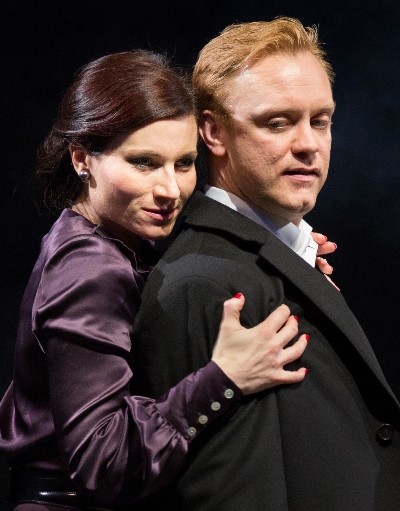London Aisle: National Theatre’s ‘King Lear’ captures folly and fall of one old but unwise
 Review: “King Lear” by William Shakespeare, at the National Theatre in London, through July 2. ★★★★★
Review: “King Lear” by William Shakespeare, at the National Theatre in London, through July 2. ★★★★★
By Lawrence B. Johnson
LONDON – Shakespeare’s willful, vain, fatally blindered King Lear enjoys all that monarchy can bring, only to discover too late that kingship is like the bubble reputation – once tossed away in a moment’s folly, irretrievable.
Thus the Fool admonishes the gray and now dispossessed Lear: “If thou wert my fool, nuncle, I’d have thee beaten for being old before thy time.” Replies the king, “How’s that?”
“Thou shouldst not have been old,” quoth the Fool, “till thou hadst been wise.”
This brief, defining exchange, which can sound merely flip and funny, bears a rare weight of sadness in the National Theatre’s illuminating production of “King Lear.”
 In the title role, Simon Russell Beale is by turns splendidly pugnacious and majestically crushed as the improvident king who takes flattery for filial affection and shuns the unembroidered love of his one faithful daughter.
In the title role, Simon Russell Beale is by turns splendidly pugnacious and majestically crushed as the improvident king who takes flattery for filial affection and shuns the unembroidered love of his one faithful daughter.
Beale brings irresistible force to Lear’s descent from outrage past incredulity into emotional oblivion. His king is not a failing old ruler eager to divest himself of royalty’s burdens, but rather a robust man, albeit well into his years, who basically has decided on early retirement.
And now he will distribute all his lands and goods among his three daughters, though first he would like to hear from each of them – Goneril, Regan and the youngest and most cherished Cordelia — just how very fond they are of their sire. The elder daughters lavish their father with the excesses he longs to hear, and he responds in kind, showering them with bountiful properties.
 But when Lear asks Cordelia (played with gentle confidence by Olivia Vinall) what she has to say, she offers one of the most famous two-syllable rejoinders in the Shakespeare canon: “Nothing.” She loves him according to their blood bond, neither more nor less. The livid king, who was prepared to bestow queenly wealth upon his favorite, instead turns his full fury on Cordelia, excoriating and then disowning her.
But when Lear asks Cordelia (played with gentle confidence by Olivia Vinall) what she has to say, she offers one of the most famous two-syllable rejoinders in the Shakespeare canon: “Nothing.” She loves him according to their blood bond, neither more nor less. The livid king, who was prepared to bestow queenly wealth upon his favorite, instead turns his full fury on Cordelia, excoriating and then disowning her.
And so begins Lear’s tragic fall. In Kate Fleetwood’s Goneril and Anna Maxwell Martin’s Regan, director Sam Mendes’ fast-paced, sharp-edged production boasts two veritable harpies as the false-hearted daughters who turn Lear’s retirement into a living hell – literally turning him out, bereft of means, to make his way in a state of nature, with no shelter from the storm.
It is in this unadorned and unprotected condition, and in this pitiless realm, that the figure of Lear becomes transmuted from specific personage to emblematic man, and Shakespeare’s dramatic web grows more richly metaphorical.
 On this wild plain gather an assembly of the dispossessed: Besides Lear and his Fool (Adrian Scarborough), their tumbled number will include the maligned and blinded Earl of Gloucester (Stephen Boxer), his wrongly impugned son Edgar (Tom Brooke), disguised – in his nakedness! – as mad Tom, and the Earl of Kent (Stanley Townsend), disguised as a servant in order to help the deranged Lear through his ordeal. It isn’t all that great a stretch from Shakespeare’s motley band to the world of Samuel Beckett.
On this wild plain gather an assembly of the dispossessed: Besides Lear and his Fool (Adrian Scarborough), their tumbled number will include the maligned and blinded Earl of Gloucester (Stephen Boxer), his wrongly impugned son Edgar (Tom Brooke), disguised – in his nakedness! – as mad Tom, and the Earl of Kent (Stanley Townsend), disguised as a servant in order to help the deranged Lear through his ordeal. It isn’t all that great a stretch from Shakespeare’s motley band to the world of Samuel Beckett.
The potency of the National’s “Lear” lies substantially with the precision and credibility of this sorry lot, on the one hand, and, on the other, the palpable viciousness of those who have caused their plight – notably, beyond Fleetwood’s Goneril and Martin’s truly demonic Regan, the latter’s gangster-like husband Cornwall (Michael Nardone) and Sam Troughton’s sinister, coldly calculating Edmund, Gloucester’s bastard son.
 As in “Hamlet,” the resolution of “King Lear” comes in calamity and death on every side, the most poignant touching Lear directly. He is doomed. There will be no reclamation for him, no restoration. His offense has been too grievous for that, his loss too great. But there is a greater sacrifice yet to come – the capstone to the fallen king’s perverse end, and to this last, intolerable devastation Beale brings a repentant father’s full measure of agony. It is heart-melting.
As in “Hamlet,” the resolution of “King Lear” comes in calamity and death on every side, the most poignant touching Lear directly. He is doomed. There will be no reclamation for him, no restoration. His offense has been too grievous for that, his loss too great. But there is a greater sacrifice yet to come – the capstone to the fallen king’s perverse end, and to this last, intolerable devastation Beale brings a repentant father’s full measure of agony. It is heart-melting.
The linear clarity of director Mendes’ telling of a complex tale is abetted by designer Anthony Ward’s unencumbered sets. But the lean style only accentuates deep streams of passion, converging one moment and conflicting the next. Here are characters grappling on a moral precipice. For many, a once-crowned fool among them, the plunge is very great indeed.
Related Links:
- Performance calendar and ticket information: Details at NationalTheatre.org.uk
- Review: At Shakespeare’s Globe, bloody revenge served au naturel in ‘Titus Andronicus’: Read it at ChicagoOntheAisle.com
Tags: Adrian Scarborough, Anna Maxwell Martin, Kate Fleetwood, King Lear, National Theatre London, Olivia Vinall, Sam Troughton, Simon Russell Beale, Stanley Townsend, Stephen Boxer, Tom Brooke

